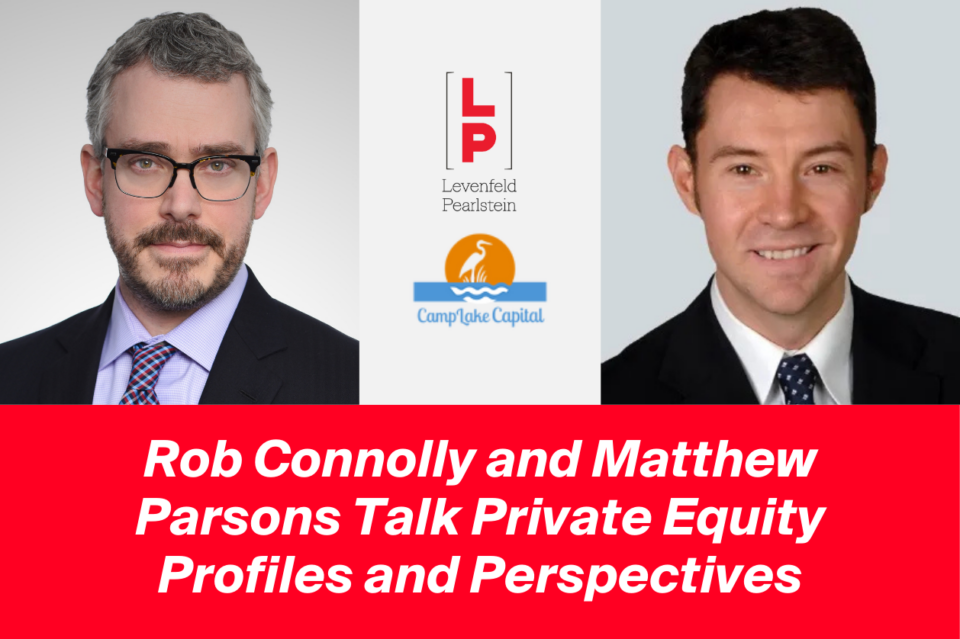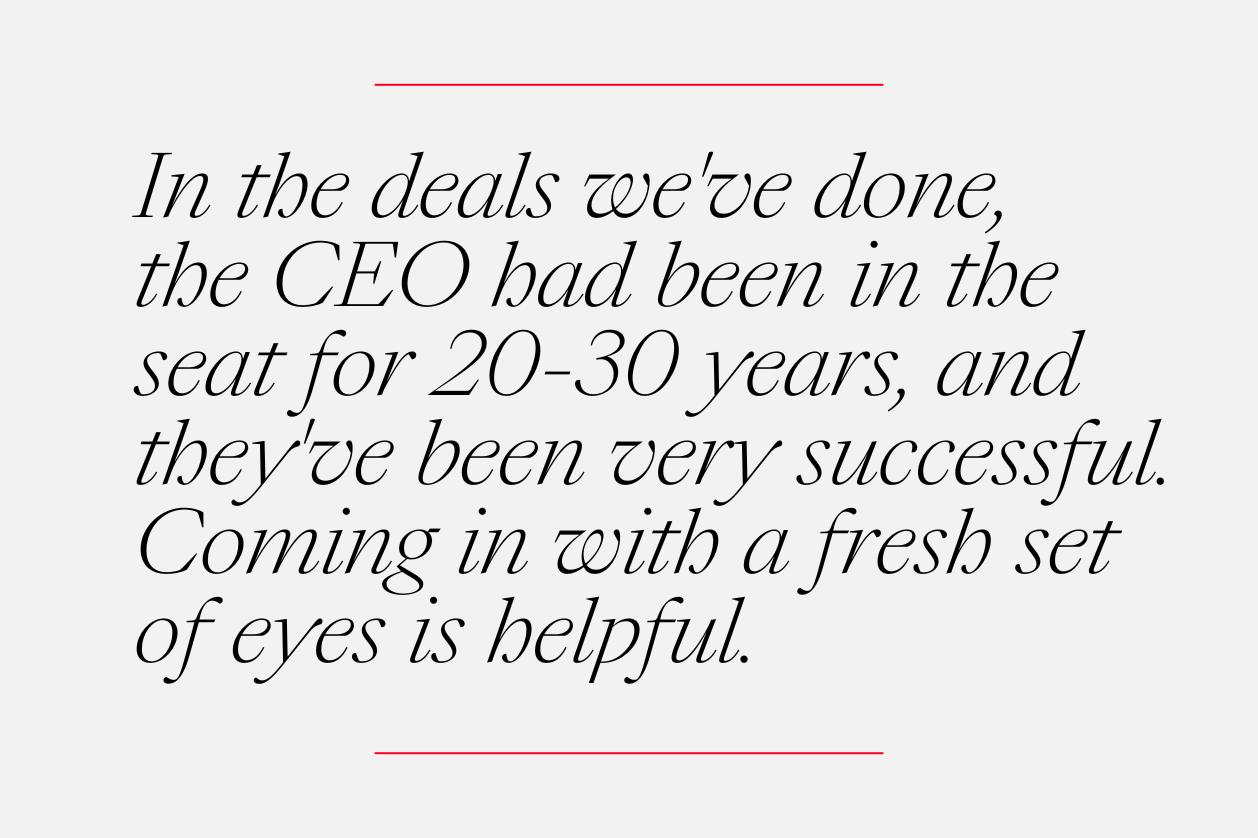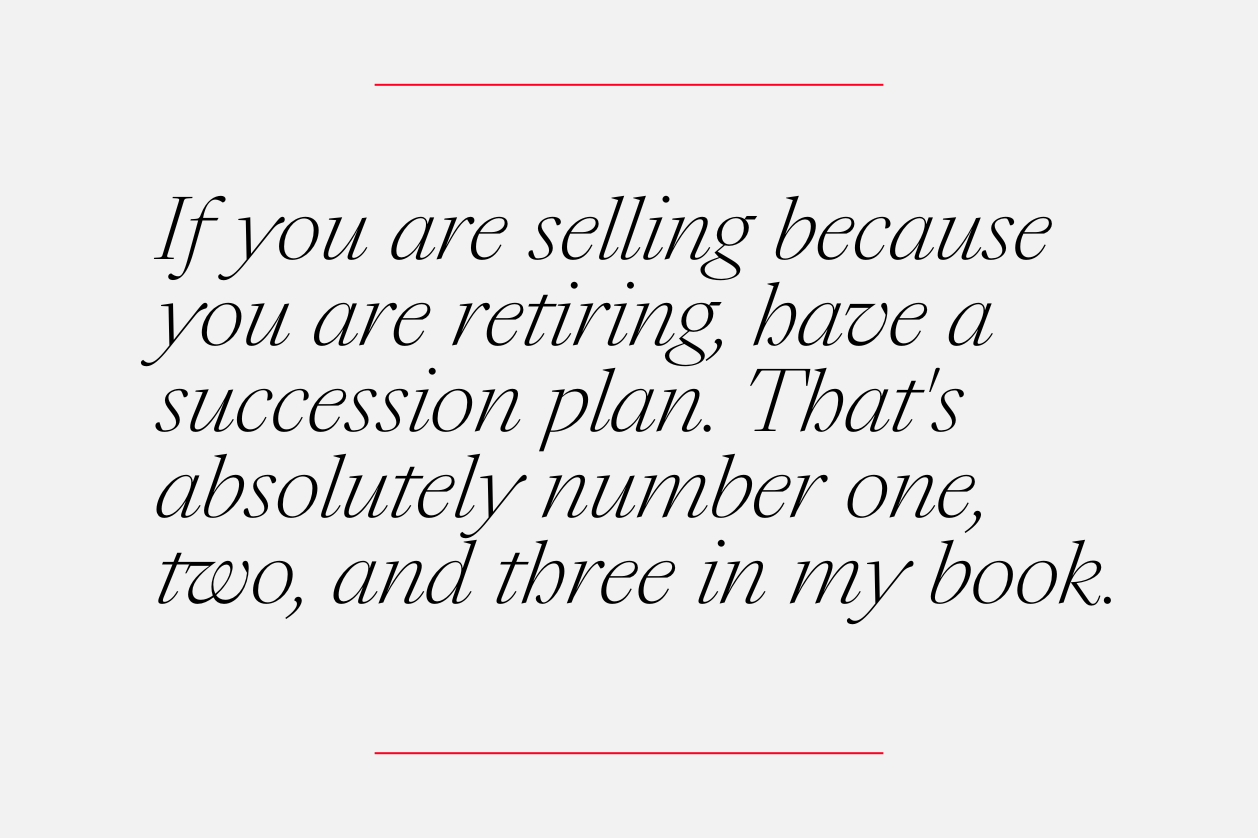Private Equity Profiles and Perspectives: A Conversation with Matthew Parsons of Camp Lake Capital

To help businesses, investors, and deal professionals better understand the evolving private equity landscape in the lower middle market, Robert Connolly – a partner in and leader of LP’s Corporate Practice Group – shares a series of conversations with private equity firms and professionals.
Below is his conversation with Matthew Parsons, founder and managing partner of Camp Lake Capital, a private investment firm focused on acquiring and growing lower middle-market businesses. Matthew has over 20 years of experience in mergers and acquisitions, primarily in the industrial sector. Before founding Camp Lake Capital, he was an investment banker with Houlihan Lokey’s industrials team for 14 years. In this Q&A, Matthew offers his perspective as an independent sponsor in the lower middle market, including his path from investment banker and how his firm differentiates itself from other financial buyers.
The responses below have been edited slightly for brevity and clarity.
How did your experience as an investment banker prepare you for your role as an independent sponsor?
I think the biggest benefit was providing me experience and aptitude closing transactions. Over the course of nearly 15 years at Houlihan and a couple of years of private equity, I probably saw 100 deals that closed or, for some reason, didn’t close. That gave me the ability to figure out how to close a deal to bridge buyer-seller value expectations, to get creative with structuring, and to understand and avoid potential deal killers. I’ve always felt that if we go into an LOI, assuming a seller is forthcoming with information, we’ll be able to get a deal closed.
With that said, being an advisor versus being a principal are wildly different things. I’ve tried to surround myself with good people – whether that’s board members, operating partners, investors or the actual management team advisors (like LP) – and that’s helped me with the ownership and management piece.
Do you feel that, with deal sourcing or network sourcing, your existing network contacts helped when you moved to becoming an independent sponsor?
Yeah, absolutely. In the first deal we worked on together, I was introduced to Gideon Schlessinger, who became a board member and investor. Gideon had known David Mudrick, the seller, at his previous job. They looked at acquiring his business back in 2016 or 2017. I was introduced to Gideon by Jordan Roper, a former Platinum Equity employee I knew while at Houlihan. That’s one example, but I’ve got a bunch of people I would consider friends more than counterparts or colleagues at this point on the private equity side who think of me if something they’re looking at generally would be too small. They hit forward or ask if I’d like an introduction. So, that’s been incredibly helpful as well.
Can you provide an overview of Camp Lake Capital and its investment strategy?
We focus on the lower middle market (maybe the low end of the lower middle market), around $2-5 million EBITDA deals, that are generally in and around the industrial space because that’s the vast majority of my background. We’re looking for stable, growing, old-line economy “Main Street” deals. We’re looking for businesses that have been around for a while. I’m not necessarily looking for the sexiest, fastest growers. I don’t want to touch healthcare or tech because I don’t understand it. Generally, these are family- and/or founder-owned businesses, given that fact pattern. We’ve closed two deals so far; both have been with companies in business for 30 and 40 years, respectively, which tells you they have a reason to exist. That’s also something I look for.
What sectors do you focus on?
Perhaps we define the industrial sector overly broadly, but I think of it as manufacturing, distribution, and industrial services. Within manufacturing, I think about things like chemicals, metals, building products, and automotive. We won’t touch oil & gas. At a high level in manufacturing, I think of it as a business where you want to wear boots, not your loafers, in the facility.
How do you differentiate Camp Lake from other financial buyers?
One differentiator is that I was fortunate to passively invest in a business called Oak Street Health very early, and that business was ultimately sold to CVS for $11 billion last year, which provided me two things: (1) the freedom to strike out on my own, and (2) the capital to do deals by myself. That allows me to differentiate from many financial parties who have investors with time horizons, who have return thresholds, and are more institutionalized than I am. We think about re-underwriting every year. If we think we’ve done everything we can do in year two, we might sell a company. But if it’s year seven, we’re still holding, and we think there’s an opportunity to materially grow EBITDA, we would go ahead and do that. This might not be the case for some more institutional parties.
You basically have an independent sponsor model but without the capital risk.
Absolutely. In fairness, we work on smaller deals ($2-4 million of EBITDA). If I were to look at businesses north of $5 million EBITDA, it would require going the institutional funding route. There are a bunch of people who have completed a bunch of transactions via the traditional independent sponsor route; they’ve all done a great job developing networks and derisking the fundraising element as much as possible. However, you’ll still always be at a disadvantage to a committed fund. So, how do you mitigate that risk as much as possible?
How do you identify and assess potential investment opportunities?
I start with a wide funnel, and there are a couple of things that are non-starters. For me, that’s customer concentration and unionization. I also look at the financial profile, ideally in that $2-5 million EBITDA range. If it’s growing faster and coming off a down year, I’m okay with that. I don’t love capital intensity. We look at free cash flow, with CapEx as a percentage of EBITDA around 10% or less. So, that’s the broadest funnel. From there, assuming the business checked those boxes and I understand the sector, I look at three things to get the “transaction right,” for lack of a better phrase.
First, that includes transaction structure (i.e. purchase price, leverage, and multiple). We don’t want to be over-leveraged.
Second, I look at the team, bifurcated into the management team and the board. Do I have a board resource smarter than me in a given industry? I’ve been fortunate enough to partner with two great guys and smart guys on our two deals so far. That’s been partially a benefit of having a broad network from my investment banking days and staying in touch with them.
Third, I consider whether I can get the macro right. For instance, I probably would not want to be in a big-ticket consumer discretionary business right now. I just don’t know where the consumer is; the data is conflicting. I also stay away from industries with volatility, like oil and gas, and anything with commodity risk.
What are the key targets or key attributes of a target that would make it most attractive to you?
The biggest thing is the management team. In the size range where we’re playing, 80% of the time the founder is the majority shareholder and the CEO. And of that, 80-90% of the time, they don’t have a succession plan. I’m not running businesses day-to-day at this point, and I think that’s what’s best for everybody. So, the question is: Is there a #2 person at the company or someone I can drop in from my network who will be involved with the business day-to-day? Is there someone who will run the business right? That’s the biggest thing for me. If I find that, I can work around a lot of other things.
We’ve been fortunate enough to have some good capital partners on the financing side. We can help with that. I’ve found that with CEOs, most of their time is not on value-added activities. It’s renewing insurance, dealing with banks, and handling permitting and licenses. We can take a lot of that stuff off their plate. That’s an attractive value proposition for sellers. They can get back to what it was they loved doing 20 years ago when they founded the business, whether it’s selling, product development, or whatever their passion is. Being able to help business owners do that, energizes them in a lot of instances.
What is your value-add for the companies you acquire?

We’re coming in with a fresh set of eyes. In the deals we’ve done, the CEO had been in the seat for 20-30 years, and they’ve been very successful. Coming in with a fresh set of eyes is helpful. For example, at one company, one of the main investment theses was sourcing better and that has absolutely proven to be the case. I underestimated the magnitude of how much it was going to be. I thought we might save $1-1.25 million, but I think it’s going to be $2 million or more in annual savings. That was partially driven by the fact that they hadn’t checked prices, renegotiated, or done anything with their suppliers in 17 years.
Coming in with a fresh set of eyes, we recommended looking into how their suppliers could help them. We were also able to improve terms. The Company had been paying a 30% deposit on each order, and now, with our two key suppliers, we’re on 45-day terms with one and 60-day terms with the other, which helps with cash flow. We also try to bring a board member with some experience in the industry who can be helpful as well.
How would you describe the current state of the M&A market in the lower middle market?
It’s a little choppy. Deal flow is certainly down. I don’t think it’s down nearly as much as in the true middle market, upper middle market, or large cap. Part of that is probably driven by demographics. Many of these sellers started businesses 30-40 years ago. They are Baby Boomers in their 60s or 70s, and a lot of them don’t have a succession plan so they have to sell. That was the case with the companies we acquired. The CEOs were 66 and 73 years old at the time of acquisition. We’ve seen that dynamic help drive business or activity.
But activity is certainly down from 2021 and the first half of 2022. I don’t know why that is, whether it’s people hearing about the choppy market or higher interest rates, which have an impact on returns and, as a result, impact purchase price and other attendant effects. It’s definitely choppier than two years ago.
What trends are you seeing with activity and valuations?
With a small sample size, I think valuations have come down, just like you’ve seen in larger markets. I won’t get into too many specifics, but I think we generally have a value bent in terms of what we’re looking to acquire. Our approach has been received a little more positively than it would have been in 2021-22.
Are you seeing any indications of activity or valuations potentially picking up? With the interest rate cut, are you seeing anything percolating in terms of uptick in activity?
My personal experience is that people are waiting to see the additional rate cuts, whether it’s 25 or 50 basis points. And whatever happens, the balance of the year, I think they’re probably also waiting to see what shakes out with the election. This is every four years, and I don’t really understand it because not a ton changes. Powell was going to raise rates no matter who was in office, but for whatever it’s worth, I think we will see an uptick in businesses coming to market right after the start of the year, particularly if the Fed cuts rates by 75 or 100 basis points by the end of the year.
How are macroeconomic factors impacting the lower middle market? Have you adjusted your strategy given that we are likely entering another upcycle?
We spent a lot of time this year on operational aspects of the portfolio and, in the past 60-90 days, have been ramping up business development and sourcing in anticipation of 2025 being a more active year. Hopefully, that bears some fruit, but I’m calling bankers, asking them to think of me if they have anything coming to market. From an investment strategy, it stays the same; it’s sending more forget-me-not letters.
While we’ve have our crystal ball out, do you have any predictions for the lower middle market over the next year or so?
I think activity picks up. Lenders are still out there, and they’re still lending. The SBC folks need to put money to work. Banks need to put money to work. If you have a good deal under LOI, the capital is there on both the equity and debt side. People have to do deals. They’ve committed to this as a career, and they don’t necessarily have the same institutional pressure that a committed fund would have from their limited partners in terms of putting money to work, but you have to do deals, or you don’t eat. So, 2025 should be pretty active.

We saw this in 2014 when seller-buyer value expectations were mismatched, and it took a full two years to get back to equilibrium. Right now, we are looking at the same time frame, maybe a little longer. Putting together the cocktail of rate cuts, elder owners who have to sell at some point, pent-up demand from the buy side, and buyer-seller value expectations coming into alignment and 2025 should be pretty active. I might have said the same thing going into 2024, but I hope that’s the case.
What advice would you give to a business owner who’s considering selling their business to an independent sponsor or any financial buyer?
I might be biased, but the first thing I would do is hire a banker or a broker. If you hire a good one, they’ll create competitive tension and get you something approaching, if not the absolute, top dollar. You’ll have a much cleaner, easier process. So that’s a broad piece of advice for selling to a financial sponsor or independent sponsor vis a vis a strategic. I would ask a seller to think about what they want. If they sell to a strategic, there is a greater risk that jobs are at risk. If they’re selling to a financial sponsor, it might be a few years before they’re selling again. There are pros and cons of each. I’ll give a plug for myself – employment is up at both companies since acquisition, and we have no fixed time horizon. So, it’s something that could be appealing to potential business owners.
How can a business owner best prepare for an acquisition process?

The easiest thing is to have a succession plan. If you are selling because you are retiring, have a succession plan. That’s absolutely number one, two, and three in my book, whether that’s grooming someone internally to take over for you or making an external hire to act as number two. Have a plan or be willing to work a set number of years to give the buyer comfort that you are going to be there. It’s always a risk when doing a deal with a founder. If you think about handing a person a pile of money who might be in their 60s, incentives can change. If there is no clear succession plan, as a buyer, you have to go in eyes wide open and acknowledge that the seller is committing to a year or two, but he might not be there full time.
That would be my biggest piece of advice: figure out what you want to do as the seller and put a plan in place to execute that. If you literally want to sell and be out day one, that’s OK, but be able to point to who the new CEO is.
And that can impact valuation, right? I like to tell sellers that the more irrelevant you make yourself to the business, the more value you’re creating for yourself in a potential exit.
Absolutely. I could not agree more.
Do you have any success stories that you’re particularly proud of?
Yeah, in the second acquisition we did about nine months ago at the end of 2023, we’ve paid off about half the debt already, and it was probably 65-70% debt-to-value. So that’s been great. We’ve hired a new CEO and COO, who just started. We’re excited about getting them in. They have a lot of good ideas and, most importantly, they have done it before. They are both 30-year electrical distribution guys, so we’re excited about having them in.
I also want to give a big congratulations shout-out to the existing team. They landed two big contracts in the past three months. One is $20 million to supply a power plant in Tennessee and the other is $13 million to supply a couple of battery storage plants in Georgia. This is for a business that does $25-30 million in revenue a year, so we feel good about the next couple of years. It’s off to a great start and hopefully it will be home run.
Do you have any lessons learned from deals that didn’t go as planned?
I think the biggest thing is you need to get your people in there. If it’s not working for whatever reason, don’t be late to make a change. With the approach we have of buying these Main Street economy businesses that have been around a long time, you get a lot of “that’s the way we’ve always done it.” It might be the best approach, but that’s not a sufficient answer for why it’s the best approach. It’s imperative to get in people aligned with your vision and where you want to take the company.
What advice would you give to a new independent sponsor looking to enter the market?
First, I would congratulate them for taking the plunge. They theoretically left either business school with some debt or a job that was paying them pretty well, so I congratulate them for taking the plunge.
With that said, I think it’s important to get yourself out there in front of equity providers, lenders, intermediaries, and business owners. If you want to do things on a proprietary basis, it’s about pounding the pavement. I was fortunate enough to be in that position.
I left Houlihan in early 2021 and took six months off. I used that time to do a lot of groundwork and talk about all the stuff CEOs have to do.
I also used that time to set up LLCs, build a website, and create a logo. I took that time to lay some groundwork and then hit the ground running from an outreach standpoint in the back half of 2021. So, I would tell people to get out there. There are a million conferences you can attend. And people are generally open to blind emails asking if they have a few minutes to chat. Whatever it is, put yourself out there.
For more information on Matthew Parsons, view his bio. For more information on Camp Lake Capital, visit their website.
Interested in participating in a future interview series? Please contact Robert Connolly at rconnolly@lplegal.com.
To read other articles in this series, please see here: Insights | LP (lplegal.com)